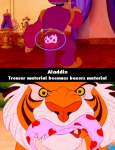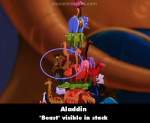Question: When Jasmine works out that Prince Ali is Aladdin (the boy from the market), why does she get angry at him? Shouldn't she be happy that he's actually alive, considering Jafar told her earlier on that Aladdin had been sentenced to death and killed?
Question: Two Questions about the Cave of Wonders: 1) The Cave states that only Aladdin can enter, but Abu enters the cave as well. That suggests that Aladdin is just the only human welcomed into the cave while the rule does not apply to animals. Why doesn't Jafar send Iago into the cave to retrieve the lamp for him? 2) The Cave also warns Aladdin not to touch any treasure besides the lamp, because if he does the cave will erupt and collapse on him. The cave is also where Aladdin and Abu meet the Magic Carpet. Clearly, they touch the carpet. Why doesn't the cave erupt and collapse when Aladdin and Abu touch the carpet?
Chosen answer: The cave has some level of sentience. It is aware of who is entering the cave, and decides whether to allow them to enter. It is able to tell that Abu is with Aladdin. It seems to keep a watchful eye on the person in the cave, and when it says "touch nothing" what it means is "don't try to take anything. It seems it was fine with them interacting with the carpet, and only had an issue when Abu was attempting to actually take something.
Question: Three questions:- 1) When the palace guards arrest Aladdin, why doesn't the head guard recognise Jasmine until she pulls the hood of her cloak down? 2) When Jasmine tells the head guard to release Aladdin, he tells her that his orders are from Jafar, but surely Jasmine's command would trump Jafar's since he and the guards work for the Sultan, which means they also work for Jasmine (as she's their employer's daughter), so why obey Jafar but not Jasmine? 3) Later on after Jasmine has told the Sultan what happened, why is only Jafar reprimanded? Surely the guards would get told off too for not obeying Jasmine earlier on.
Chosen answer: 1) Razoul would have no reason to think the princess was out of the palace and wandering the streets. At most, he would assume there was a resemblance. 2) Jafar gets his orders and power from the Sultan, who trumps Jasmine. As vizier, part of his job is to relay the Sultan's orders. 3) The guards were just following orders of Jafar.
Question: Why do Jafar and Aladdin call the Sultan "Your Highness," and not "Your Majesty" or something similar? I thought Your Highness was only for Princes and Princesses.
Question: Can anyone name all the people that the Genie impersonates throughout the movie in order?
Answer: While the Genie takes on the archetype characteristics of many cliché personalities, the recognizable imitation of celebrities appear as follow (quotes associated with these characters are in parenthesis) 1. Arnold Schwarzenegger ("ever impressive") 2. Ed Sullivan ("Right here direct from the lamp") 3. Groucho Marx ("no substitutions") 4. Robert DeNiro ("You lookin' at me") 5. Arsenio Hall ("Wo wo wo") 6. Rodney Dangerfield ("I can't believe I'm losing to a rug") 7. Jack Nicholson ("alright Sparky") 8. Martin Luther King, Jr ("Free at last") and for the record, the scene of the dancing elephants during the song "Never Have a Friend Like Me" are a direct lift from "Dumbo".
Question: Genie tells Aladdin he cannot kill, or make anyone fall in love, or bring people back from the dead. He also tells Aladdin he cannot wish for more wishes. Shouldn't that make four rules not three?
Answer: The three rules refer to what he could wish for, not how many. It's like a coupon that tells you both what it's good for and limit one per customer. The rules about distinct things that don't affect each other.
Answer: The Genie never actually says that he has "3 rules", he just numbers the three you mentioned as he is explaining them. He told Aladdin about the "no more wishes" rule before he sang "Never Had a Friend Like Me." He doesn't include "no more wishes" in his list of rules because Aladdin already knew about it.
Yes of course it's a rule. What difference does it make?
I meant yes it would make four rules.
He says there are a few "provisors", a few "quid pro quo's" (which doesn't make any sense) to the 3 wishes he can do. That's what he can't do because he is limited into doing them. However, the not getting more than 3 wishes is something the Genie himself won't do for him. The 3 limitations he sums up are about the wishes itself, the fact he can do only 3 is a separate rule the Genie himself won't do. So the wishes have only 3 official rules because the Genie can't do anything about them, and 1 particular wish the Genie simply won't grant.
Answer: There is a difference between what he cannot do and won't do.
You're going to going to need to be more specific.
Question: At the end of the film, the Genie asks Aladdin to wish for the Nile. Why? Aladdin can't wish anymore, since his third wish was used to free the Genie.
Answer: The Genie's simply relishing his new-found freedom - he asks Aladdin to wish for something outrageous simply so that he can have the pleasure of saying "no". The fact that Aladdin has no wishes left anyway is purely a technicality. There is also a hidden joke - Genie said "wish for something. The Nile, wish for the Nile" (sounding like 'denial'). So when genie said "no", it was granting Aladdin's wish while denying him his wish at the same time.
Question: When the genie learns that Aladdin tricked him into getting them out of the cave without making a wish, couldn't he have just teleported Aladdin, Abu, and the carpet back inside the cave to make sure Aladdin wishes himself out of the cave?
Answer: He is not an evil genie and, even though he was tricked, he would not have wanted Aladdin to be trapped in the cave again. He likes Aladdin and admires his cleverness in getting himself out of the cave without wasting a wish.
What I was wondering is why he likes Aladdin.
"He is not an evil genie" who says only an evil genie would teleport Aladdin, Abu, and the carpet back inside the cave to make sure Aladdin wishes himself out of the cave?
Question: Throughout the whole movie, why does Jasmine have such hostility toward Jafar? The scene where Aladdin was captured by the guards on Jafar's orders, she seems angry that Jafar had a stranger taken from the market place. In the scene of Jasmine's and Jafar's first appearance together, she confronts him angrily asking Jafar about the arrest. When his reply was justifiable she is still upset with him. And in the scene where the Sultan, Jafar, and Jasmine are all in the room discussing the incident, Jasmine says she wants to get rid of Jafar. (00:23:20 - 00:41:15)
Answer: Also, Jasmine reveals in that first scene that Aladdin's arrest wasn't justifiable. Jafar told her he had him arrested for kidnapping her, to which Jasmine reveals that he didn't kidnap her; she ran away. Then Jafar reveals that he had Aladdin executed, which can seemingly only be done upon approval from the sultan. Jasmine loathes him so much because he allowed for the death of an innocent boy without checking with anyone first.
Question: Jafar apparently knows that genies can grant only three wishes, since he refers to his wish for Jasmine to fall in love with him as his "final wish." He appears to be tricked into thinking that this wish has been granted because of how Jasmine acts seconds later. Later on, Jafar makes a wish to become a genie. I've never understood it, if Jafar thinks his original final wish has been granted, why would he make a second final wish?
Question: When Aladdin is thrown into the water by the guards and the Genie turns into a sub to save him, the sub-Genie speaks something in what sounds like German. What does he say?
Answer: Nothing. He was babbling it. Even the closed captions say " (babbling the German language)," which means he wasn't saying anything real in German; he was just mimicking it and speaking gibberish.
Question: Wouldn't Aladdin have one more wish, since technically he didn't wish for Genie to save him from the water?
Answer: Technically, yes. He would still have one wish left. After being knocked out, Genie asks Aladdin if he wishes for his life to be saved. After grabbing Aladdin, his head drops down, which Genie takes as a yes, However, since Aladdin was unconscious the whole time, he never actually confirmed the wish. Genie only assumed he did. Also, since Aladdin was out cold, he could once again make a case that he never wished for his life to be saved since he wasn't awake to make it.
Chosen answer: Under the rules that the genie lives by, he can only use his abilities to grant three wishes per person. He's already technically broken those rules once, when he helped Aladdin escape from the cave, despite Aladdin not actually wishing for it, but that wasn't an intentional violation; it can be considered a mistake on the genie's part, a misunderstanding of what Aladdin actually said. As he said after that incident, he can't give Aladdin any more freebies; while he can stretch the rules a bit, he can't consciously break them again by using his power on another non-wish, even to save a life. The genie's taking Aladdin's unconscious "nod" as affirmation that he agrees to use his second wish to be rescued from drowning. By the rules that govern the genie's existence, even though Aladdin didn't actually say it, it has to count as one of his wishes.
Question: Many of the mistakes that are listed and corrected state that Aladdin takes place before 1 AD. Since it is never stated in the movie when exactly (although the assumption is the 1400s), where are people coming up with that date?
Answer: No it does not take place before 1 AD because they are Muslims and the Muslim religion didn't exist until the 7th century. People who have no idea about history however usually assume an ancient setting like Aladdin takes place before the birth of Christ because that's the oldest time they know. They can't pinpoint the time accurately enough.
Question: Two questions. 1) Why does the Sultan pick on Iago all the time - force feeding him stale crackers and when he's on the magic carpet, chasing after him? 2) Why is the Sultan so rough with the magic carpet? When he goes for a ride on it after Aladdin shows up at the palace as Prince Ali, he rides it around the palace in such a reckless manner that when he's finished, the carpet can barely walk.
Answer: Iago to him is just a parrot, not a sentient being like we know. He genuinely thinks Iago likes the cookies. The magic carpet is the one being rough, being in control since he is just giving the Sultan a thrill ride. It's trying to make a good impression for Aladdin by giving the Sultan a great time.
Answer: The Sultan is a goofy, clumsy guy who doesn't realise he's being rough.








Answer: Aladdin is referring to the person riding the horse as being a "horse's ass" in the way he is acting, thus the horse the person was riding on has two rear ends, his own and the rider.
Mark English